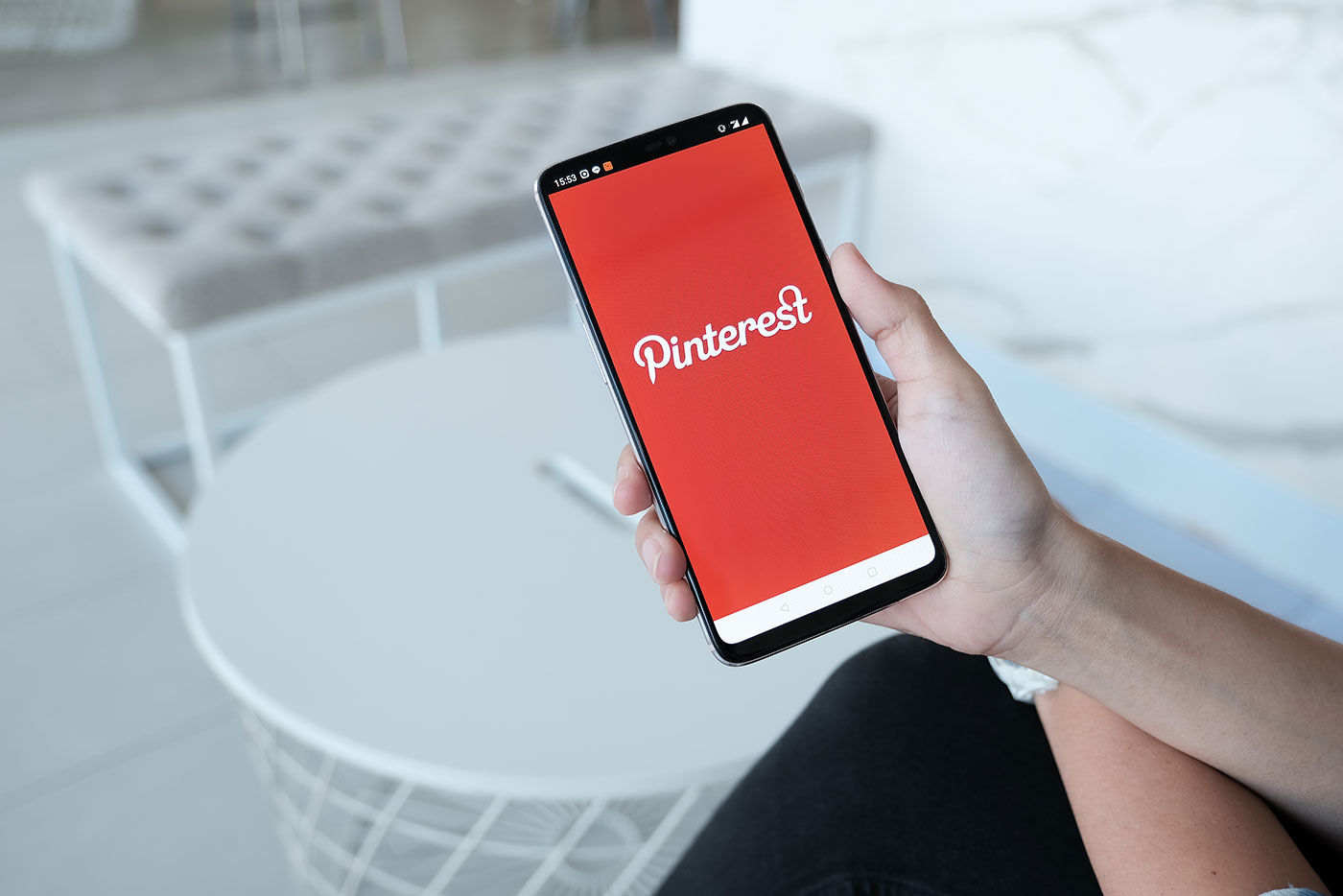Pinterest Keyword Research Tips to Get More Traffic
If you’re doing business online or thinking about it, you probably know how difficult and expensive it can be to rank on Google. Fortunately, Pinterest is a fantastic alternative that you can use — the competition isn’t nearly as stiff and it’s free. Many companies are under the mistaken impression that Pinterest is just a bulletin board of pictures or images that people look through when they are bored. In reality, Pinterest is the 4th largest social network in the United States and has around 300 million users worldwide. In addition, unlike Google, you don’t have to wait months to be found, so you will attract attention that much faster. With that kind of popularity and opportunity, why wouldn’t you include Pinterest in your marketing?
Pinterest Keyword Tool: Getting Started
Before you start creating boards, content, pins, following others, repinning, etc., you should answer some pretty basic questions:
- Does what I’m promoting solve a problem my audience wants to solve?
- Is there an audience even looking for the information that I’m planning to provide?
- Do I have or can I create to inspire my audience to take the next step? Click, Sign Up, Buy.
Assuming you can answer yes to these questions, Pinterest keyword research is the next thing you need to do to maximize your results. To accomplish this task, you’ll need to create a Pinterest business account to use the Pinterest keyword search tool within Analytics as well as other tools to manage your businesses’ efforts on the platform. To do this simply:
- Log into your existing Pinterest account.
- In the top-right corner you’ll see a down arrow.
- Click it to open the menu then select “Add a Business Account”,
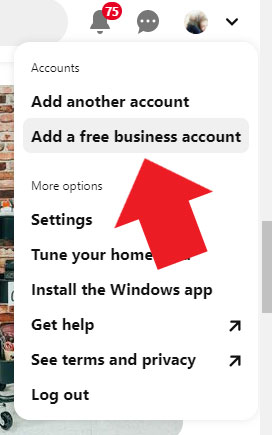
- followed by “get started”.
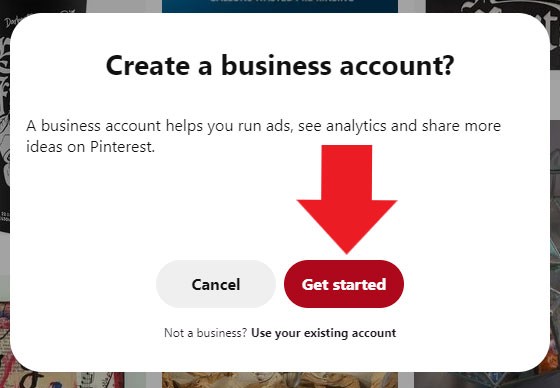
- A wizard will then lead you through the process of creating your account.
- If you prefer, you can also create a business account that isn’t linked with your personal account.
You’ll save yourself some frustration if, before you start the process of creating your business account, you’ve already decided:
- What you want to name your business
- What you want to include in your profile – including the words you’ve identified with your keyword research for Pinterest – and what your cover photo will be.
- You should also have the URL for your website handy.
- You should know what business category you fit into on Pinterest.
- Lastly, you’ll need to have a good idea of the content you want to post.
A few of these questions will be asked right away on the sign-up page:
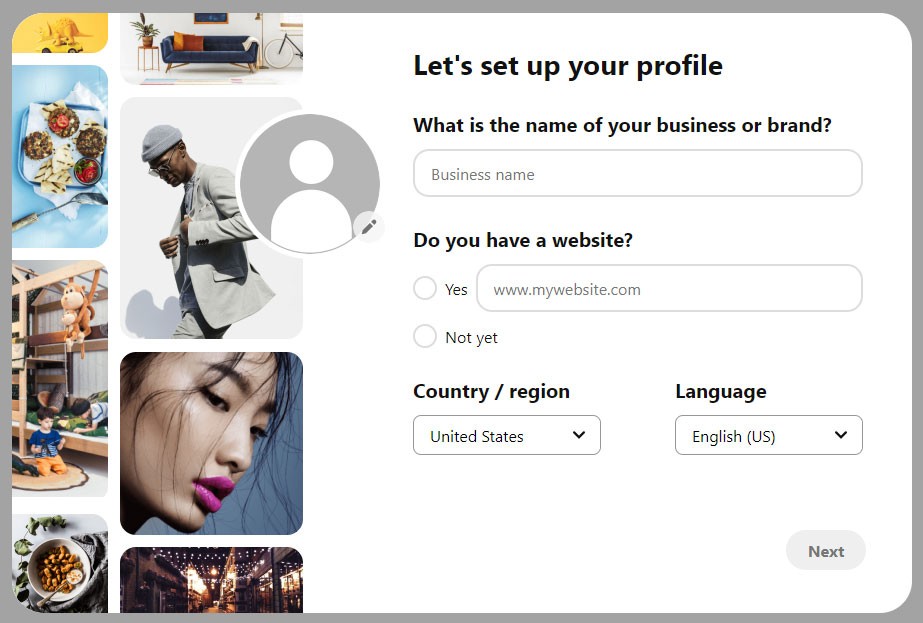
On Pinterest, the old adage, “a picture is worth a thousand words” couldn’t be more true. In fact, Pinterest did a study of users and found that 85% of pinners find visuals more important than text.
However, you still need to remember that even though Pinterest is visual, it is essentially a search engine. That means it is logical. Everything you pin needs to be searchable and the Pinterest algorithm needs to be able to find and categorize your pins so your target audience sees them. Getting the Pinterest audience to see your pins is essential to interacting with them and getting them to your blog or website to make the sale. The Pinterest keyword search tool will be one of your best friends as you determine the content that will most likely resonate with the people you most want to reach as they scroll through their Pinterest feeds.
Test your website’s SEO and social media score in 60 seconds!
Diib is one of the best SEO and social media monitoring tools in the world. Diib syncs to Facebook and Google Analytics and uses the power of big data to help you quickly and easily increase your social media traffic and SEO rankings.
- Easy-to-use automated social media + SEO tool
- Keyword and backlink monitoring + ideas
- Speed, security, + Core Vitals tracking
- Automated ideas to improve Social Media traffic + sales
- Over 500,000 global members
- Built-in benchmarking and competitor analysis
Used by over 500k companies and organizations:
Syncs with 
Know Your Pinterest Audience
You will need to determine who your audience is to begin your Pinterest keyword search. What is their persona? Likes? Dislikes? Hopes? Dreams? Having this information will help inform your search terms, or how they might look for your solution. For example, if you write a blog about pets and you want to sell a solution for an animal’s fear of thunderstorms, keyword research for Pinterest would reveal different keywords strings for a persona that was concerned with holistic approaches versus a persona that just wants to solve the problem. In fact, having buyer personas is perhaps one of the best secret weapons you can have for being able to truly understand and connect with Pinterest audience niches. Although fictional, the personas you’ll create should be so well developed that they could be real people.
Create several different personas to represent the niche audiences you’ve identified that will use or relate to whatever you’re promoting on Pinterest. Keep in mind that the overwhelming majority of Pinterest’s audience is female, which will affect the way you approach personal development if your product is stereotypically more appealing to men. With well-developed personas in hand you’ll find it much easier to create the targeted messaging you need to connect with and engage your audience which will ultimately increase your campaigns’ success.
You can use Pinterest analytics tools to help you build your personas. Access the analytics areas and click on audience insights. The dashboard here will tell you about the age, gender and geographic location of your audience. Even more insightful is the categories and interests sections. Here you’ll see the keyword research Pinterest has gathered for you based on the categories and topics people within your audience have searched.
Pinterest Analytics
If you haven’t already, brainstorm a list of five to ten words that describe your business in a succinct manner. With some basic ideas for keywords in mind, you can now do keyword research as a Pinterest user by simply typing in a keyword and seeing what the auto-suggest feature shows you. These are still pretty broad keywords that are often referred to as seed keywords. Your next step is to use the guided search to build your long-tail, or more specific keyword phrases. To get there, click on one of the auto-suggested keywords from your search, and you’ll see several colored tabs appear underneath the search bar with more specific or targeted aspects of your broad topic. Here are a few examples of long-tail keyword suggestions that show up on the Pinterest Keyword Tool:
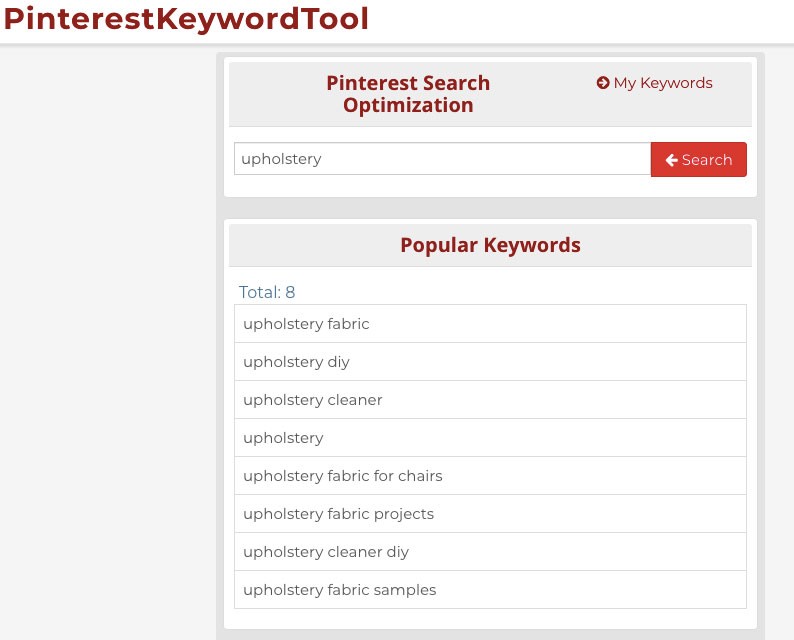
(Image Credit: SpyFu)
You Might Also Like
For more data, use the Pinterest keyword tool in the platform’s Analytics section. Once again, you’ll want to be signed into your business account. On the top menus, select Analytics and then click on Trends. The Pinterest keyword tool works by typing in a general keyword. Pinterest will return up to seven options with some traffic trend graphs. Click on each suggestion for additional ideas that will typically include long-tail options. In addition, with this keyword research Pinterest will show you some of the top pins in that category so you can see what you are up against. For example:
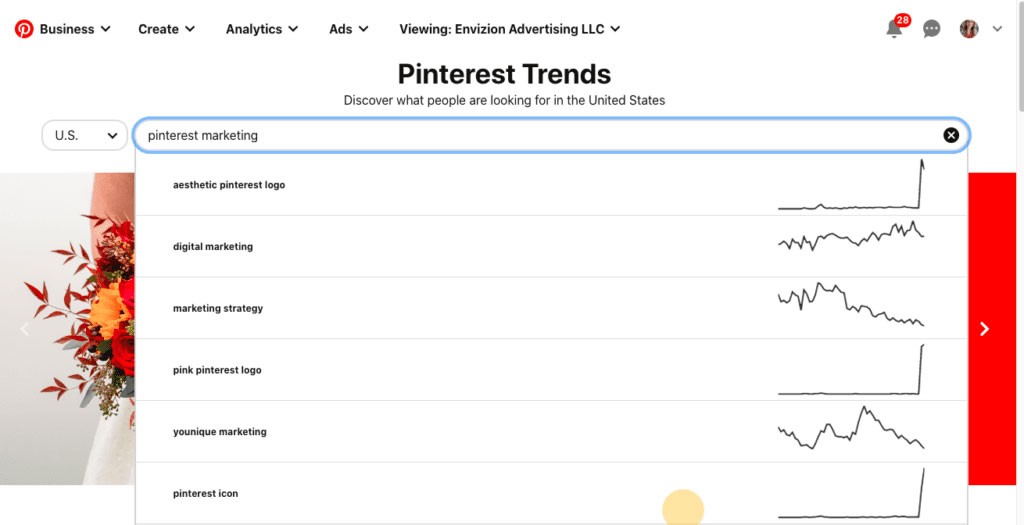
(Image Credit: Laura Rike)
Looking at what your competition is posting is an important aspect of building a successful Pinterest campaign. You don’t want to waste time posting something that won’t stand up to the other options your audience is seeing, because your competitors will get most of the clicks and you’ll be wondering why you seemingly did everything by the book and still had no results.
When analyzing Pinterest keyword research and pins, you need to be objective, subjective, and brutally honest with yourself:
- Am I able to create a more attention-grabbing post than the most popular Pins I’m seeing?
- Could I use different keywords and create an attractive Pin that is still an accurate description of my post?
- Is there a way to market my idea from a different angle than the method used by the popular pins?
We hope that you found this article useful.
If you want to know more interesting about your site health, get personal recommendations and alerts, scan your website by Diib. It only takes 60 seconds.
Using Your Keywords for Results
Completing a Pinterest keyword search is just the beginning of creating a successful Pinterest search engine optimization (SEO) campaign. Since Pinterest is a visual search engine the best place to start is by optimizing the pictures with alt-text on your blog or website. This way, when you or someone else pins an image from your site, the alt-text you wrote will be used as the description for the Pin. If you don’t take this step, the Pin created from your website-based image will be assigned a random number instead of the keywords that will help you be found.
On Pinterest itself your profile name is the place to start with your keywords. When people see your profile it should be easy for them to understand what you have to offer, which means you need to optimize your name. This can be a challenge with the 30-character limit, so you may need to be creative.
Next you’ll want to create some boards with titles that match your keywords categories – the full category name that people search. The board descriptions should be complete sentences, detailed and very relevant to what you’ve titled the board. Be sure to add your business name, just in case someone searches for it. There isn’t any reason to use hashtag keywords on Pinterest, they no longer matter for optimization on the platform as of early 2021. Look at the image below for example. This business sells DIY crafts and they have boards on very specific DIY topics.
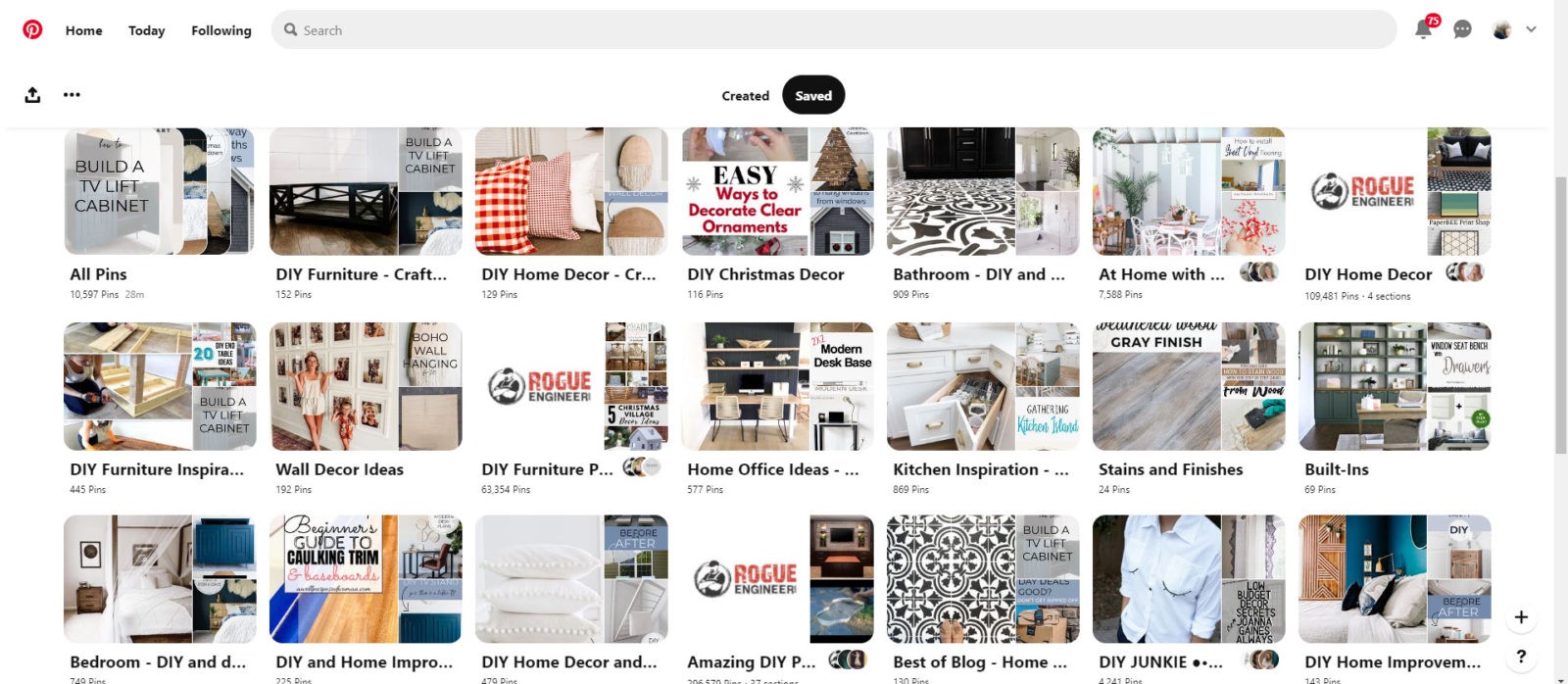
Each Pin you create for your boards should have a description that follows the same methodology outlined above. Be descriptive, relevant and use the results you discovered through the use of the Pinterest keyword tool. There is one caution though. Don’t pin on every board you have. Placing your post on a board that is not relevant can actually hurt your results.
Pinterest Tips for Success
- Fresh content rules! The Pinterest algorithm prefers pictures, graphics, images, or videos that are new and haven’t previously been anywhere posted online. The ultimate is to have new imagery from a newly published blog or website page so the content is both new to the internet and new to Pinterest.
- Don’t reuse images. Reusing pics that have been used in the past on different boards, even with a refreshed title or description, won’t rank as well brand new pics and therefore will have weaker distribution and likely a smaller audience. While this may make more work for businesses trying to leverage Pinterest for traffic, you can understand how important showing new content is to keeping Pinterest users coming back to the platform!
- Be timely. Keyword research for Pinterest should also take timeliness into consideration. Take advantage of the trends information Pinterest makes available and also plan seasonal content well in advance.
- Keep your pins relevant. Customize your posts to each specific board you add to and make sure the copy, images and link are aligned.
- Watch your Pin performance analytics carefully. If your pin doesn’t seem to be attracting attention, tweak it to make it more relevant to what you see trending in popularity.
- Be cautious about duplicating your Pins. While it may seem like the most efficient way to go, Pinterest recommends that pinners only post to their 10 most highly relevant boards and to not duplicate URL and image combinations exactly. Just remember that the idea is for the image to provide a significantly different experience for the audience. Some ways you can create multiple Pins include:
- Have several branded templates you can use
- Try a photo collage with one version
- Use a text overlay on one photo image
- Use a few different quotes or key points from the post as text images
- Use significantly different fonts on a couple of pins.
- The more new Pins you make the better. You actually don’t have to completely reinvent the wheel to have a fresh post. Testing your posts is just as important as a Pinterest keyword search. Try different formats, titles, images, backgrounds, colors or descriptions to see which are most effective at engaging your audience. Remember to only change one thing at a time so you know which changes made the difference in your results.
- Quality trumps quantity. It is much more important that you have pins that are new, meet keyword research Pinterest points to, and are relevant to your audience, than to publish numerous pins for the sake of getting your numbers up. Believe it or not, when you publish fewer Pins with an eye to new and fresh content, you’ll actually see an increased distribution, which should result in increased traffic and audience engagement.
- Frequency matters. The frequency of your posts and what you post also matters. Pinterest actually shows your posts to your followers first to gauge whether or not the content gains any traction. The more interaction you get from your followers, the higher it will rank for future distribution on the feed. So, while you want to vary your pins to create fresh content, you don’t want to post them all at once or your followers will unfollow you. Instead mix in other relevant content on your boards that is helpful to your audience and supports your business goals. There are products available to help you with planning and scheduling your posts so you can ensure a good mix of content to keep your fans engaged.
- Interaction counts. Be sure you interact with people leaving comments on your Pins. The activity on your Pin plays a role in how it ranks and by answering comments you can engage and encourage more activity. This can also help increase your followers and help some in having your Pins to be seen on the feed more quickly.
The key to being successful on Pinterest is to be strategic, have a well-thought-out plan and know who your intended audience is. When you have this information, you’ll be able to use your keyword search efforts to identify the words to target for optimal results. Another thing to keep in mind when working with keywords is to write your description so that it sounds natural, if it sounds funny just so you can work the long-tail keyword in, rewrite it until it sounds right.
Diib®: Professional Keyword Tool!
With so much emphasis on social media (and Pinterest), it can be easy to let your website SEO slip. With Diib Digital on your side, you will have more time for your social media campaigns and amping up your traffic. Here are some of the ways we’ll keep up on the statistical aspects of your website:
- Social media integration and performance
- Platform specific audience demographics
- Keyword, backlink, and indexing monitoring and tracking tools
- User experience and mobile speed optimization
- Technical SEO monitoring
Click here for your free scan or simply call 800-303-3510 to speak to one of our growth experts.
FAQ’s
This is really pretty simple. Head over to your Pinterest profile, select the board you’re looking to add new keywords to, and click edit your board description. In that box, type in your new keywords and click save.
Keyword difficulty measures how difficult it could be for you to rank for a certain keyword. The higher the competition, the higher the difficulty and the more difficult it could be to rank for that specific keyword.
Using one target keyword and 4-5 similar keywords can compliment your article and help Google effectively place your article.
This is a social network specifically for people to find inspiration and ideas for their hobbies and interests. Each idea is represented by a Pin, which is a saved image that can be searched and saved by other Pinterest users. Pins also have the ability to link back to websites, which has great potential for driving traffic.
Pinterest is just as safe as any other social media website as it is password protected. You also aren’t asked any personal or financial information which could be stored and hacked.
